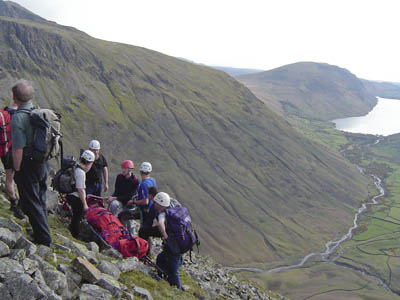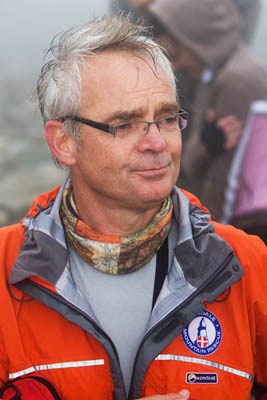Rescue teams today warned they will find it difficult to deal with the demand if an unprecedented rise in calls for help continues.
The Lake District’s 12 mountain rescue teams have had to deal with more than 100 callouts in the first three months of this year. The volunteers who respond to calls for help on the Lakeland fells say those venturing on to the region’s mountains must treat them with respect.
With the peak tourist season approaching, the Lake District Search and Mountain Rescue Association fears its resources will be stretched following a year which has already seen a rise in 999 of more than a fifth in the number of calls to its teams, whose members are all unpaid volunteers and most of whom have day jobs.
Events such as the Three Peaks Challenge, in which walkers tackle Ben Nevis, Scafell Pike and Snowdon, add to the Lakes’ MRTs’ workload – Scafell Pike usually being walked during the night by participants often inexperienced in finding their way on the fells. The weeks around the approaching summer solstice mark the high point of demand for teams in the area as challengers take advantage of the longest daylight hours.
The association’s chairman Richard Warren said: “Incidents for the first three months of 2009 are up by 22 per cent compared to the same period last year, which in itself was a problem year for the 12 teams. There were 113 incidents up to 31 March 2009 compared to 93 in 2008.
“Summer is here; the numbers of tourists to the region is expected to soar – the challenge events continue to draw participants in their thousands. Walkers and climbers must treat the mountains with the respect they deserve and be appropriately prepared, experienced and equipped.
“Teams will and can deal with multiple callouts but it will become increasingly more difficult if we can’t halt this worrying trend.”
Recently, the Lake District mountain rescue teams mounted a major campaign to educate the public in the need to be properly equipped and to be able to navigate on the fells in poor visibility.
Mr Warren said: “Unfortunately, the message of being prepared and appropriately equipped and experienced that we have been passing out to the public over the past two years does not seem to be having the desired effect.”
The 12 teams represented by the LDSMRA are among 56 teams with more than 3,500 members covering England and Wales. The volunteers are on call 24 hours a day, 365 days of the year.
More than a half of England and Wales’s mountain rescues take place in the Lake District. Annual running costs of each team vary from £30,000 to £70,000, raised by donations and fundraising efforts by the teams.


Ken Hobbs
11 June 2009I have been saying for years that the best way around this is to have manned checkpoints at the beginning of the popular hill paths where walkers are checked to make sure they have the correct equipment and know how to use it. Maybe time for walkers to be required to have insurance also so that they public purse does not suffer because of these idiots?
DAN
11 June 2009GET REAL HOBBS !!!!!!!!!
Steve
11 June 2009You really need to take this message into the schools, to educate people at a young age about the dangers of going unprepared to the hills. The risk is that you put people off from exploring and enjoying the hills. The idea of checkpoints on hill paths isn't the best though, it's completely unenforceable.
Jhimmy
11 June 2009I have previously said that "challenge events" organisers should hire a local guide for the duration of the event and participants should be issued his mobile number in case they get into difficulty, navigational or accident wise.
Also, to encourage people to enjoy the hill/mountains and not put in the proper infrastruction to deal with this extra popularity is a huge mistake ie, try building roads without road signs or maps!
What really annoys me though, is why promote hill walking in the first place? Surely, people have their own mind. Why do you have to tell them to walk in the hills, if they enjoy it they'd go anyway.
The Piglit
13 June 2009Oh Ken you are hero and visionary! I would go one step further though and introduce a compulsory hill walking licence.